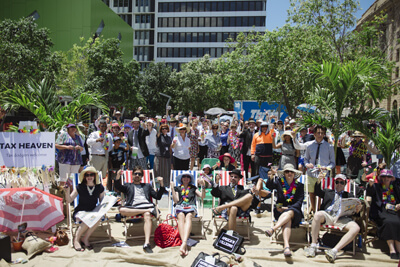
The G20 Leader’s Summit kicks off in Brisbane tomorrow. JOHN BECKETT, national coordinator of Micah Challenge Australia, says the world’s poor must not be forgotten in any action against international tax avoidance…
There will be a lot of political and economic muscle being flexed around Brisbane this week with the leaders of the world’s largest economies flying in to town.
While it may seem that it is a talkfest or an opportunity for bravado by the leaders (not the least by our own Prime Minister), the reality is that there will be enormous potential for influence, both good and bad, gathered around the collective G20 decision making table.
 |
|
CHALLENGING THE STATUS QUO: Protestors at last weekend’s event highlighting the issue of multi-national tax avoidance. PICTURE: Micah Challenge “The world’s most powerful economies, including our own, have woken up to the problem. They now see the potential for increased revenue for their national budgets if they can effectively address it. The question remains, will it also benefit people whose interests are not represented around the table?” |
One item firmly on the agenda for these leaders is the question of tax dodging.
Using a variety of complex methods (some illegal, some legal but questionable), multi-national companies are often able to avoid tax on large parts of their business activities. Sadly, as with any form of corruption or unethical behaviour, it is the world’s poorest people who end up suffering the most.
Last weekend I joined together with a crowd of people in the centre of Brisbane as part of the world’s biggest mock tax haven. The group represented the voices of many thousands around the world, in both developed and developing world communities, who want to make sure that there is action at the G20 to promote transparency, and that the world’s poorest people are front and centre in the leader’s minds as they make their decisions.
The impact of this problem is difficult to get an accurate handle on because of the veil of secrecy that currently casts a very long shadow over the global financial system. Christian Aid estimated that in 2008, developing countries lost more than $US160 billion through just two forms of multi-national corporate tax dodging. This figure – a very conservative estimate – dwarfs the amount that these countries receive in aid, which amounted to $US120 billion in 2009.
This is money that rightfully belongs to the citizens of these developing countries. It is money that could be being used to fund vital development and the provision of essential services. The United Nations estimates that every $US100 million recovered from tax dodging and corruption could fund full immunisations for four million children, provide water connections for some 250,000 households, or fund treatment for over 600,000 people with HIV/AIDS for a full year.
The world’s most powerful economies, including our own, have woken up to the problem. They now see the potential for increased revenue for their national budgets if they can effectively address it. The question remains, will it also benefit people whose interests are not represented around the table?
For example, the G20 finance ministers recently agreed to a global standard for automatic exchange of tax information, where nations agree to share information about one another’s residents who are making profits within their borders. This is a positive step in the right direction, yet developing countries will find it especially difficult to implement the multi-lateral standard if their tax authorities are required to collect and share information to the same level as the world’s best resourced tax authorities.
So what needs to happen this weekend if the poorest people and nations are to benefit from action to address tax dodging?
For starters, the G20 has indicated it intends to support developing countries with capacity building so they can participate with the automatic exchange standard. We need concrete commitments in this area.
However, automatic exchange of information won’t work in isolation. In order to ensure tax is paid in the country where the economic activity takes place, G20 leaders will need to ensure much greater levels of transparency on the tax activities of multi-national corporations by progressing a country-by-country reporting standard. Multi-nationals are currently only required to report on a globally or regionally aggregated basis, so it is relatively easy for them to shift profits between their subsidiaries.
Requiring companies to publicly report their operations and activities for every country in which they operate will not only make it harder for them to evade their fair share of tax, it will also enable citizens of all countries to hold governments to account for how they raise and spend corporate tax revenue. The OECD has developed guidelines for a global reporting standard, but it is unclear whether these guidelines will be adopted by the G20 when they meet. There has already been progress in the United States, the European Union and Canada on this reporting standard but sadly Australia, as the host nation, is lagging behind.
With great power comes great responsibility. These words ring true this weekend. There will indeed be great power in the room, and there is a lot at stake. Our leaders have the opportunity to choose whether or not they take concrete steps towards a fairer and more sustainable world by tackling tax dodging and improving transparency.
Those who took to the streets on Saturday stand shoulder-to-shoulder with millions in rich and poor communities all over the world who have been calling for justice in the global financial system over the last couple of years. Together, we will be watching with interest.
John Beckett is the national coordinator of Micah Challenge Australia.





